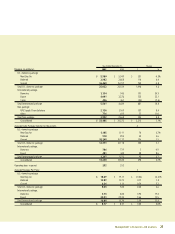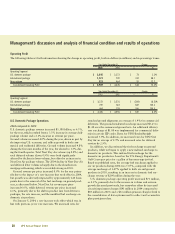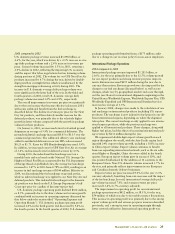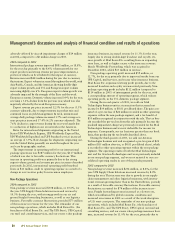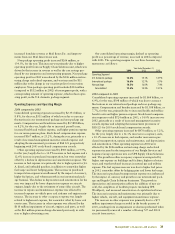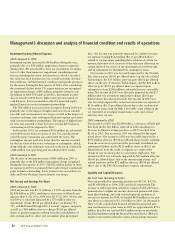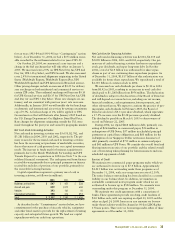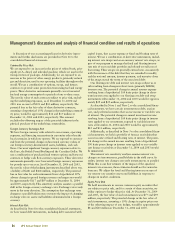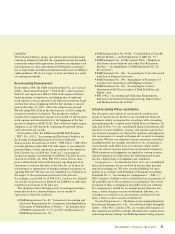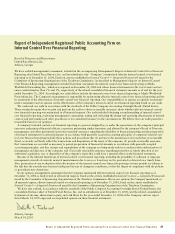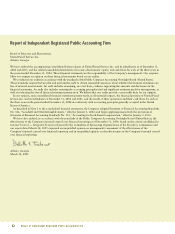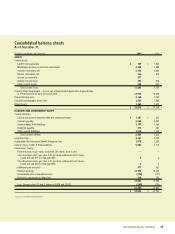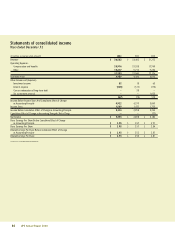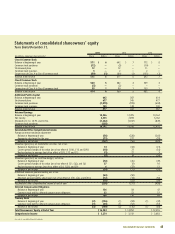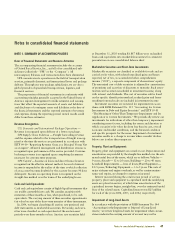UPS 2004 Annual Report Download - page 39
Download and view the complete annual report
Please find page 39 of the 2004 UPS annual report below. You can navigate through the pages in the report by either clicking on the pages listed below, or by using the keyword search tool below to find specific information within the annual report.
Management’s discussion and analysis 37
Credit Risk
The forward contracts, swaps, and options previously discussed
contain an element of risk that the counterparties may be unable
to meet the terms of the agreements. However, we minimize such
risk exposures for these instruments by limiting the counterpar-
ties to large banks and financial institutions that meet established
credit guidelines. We do not expect to incur any losses as a result
of counterparty default.
New Accounting Pronouncements
In December 2004, the FASB issued Statement No. 123 (revised
2004), “Share-Based Payment” (“FAS 123R”), which replaces
FAS 123 and supercedes APB 25. FAS 123R requires all share-
based payments to employees, including grants of employee
stock options, to be recognized in the financial statements based
on their fair values, beginning with the first interim or annual
period after June 15, 2005, with early adoption encouraged.
We will adopt FAS 123R in the third quarter of 2005, using the
prospective method of adoption. The prospective method
requires that compensation expense be recorded for all unvested
stock options and restricted stock at the beginning of the first
quarter of adoption of FAS 123R. There will be no impact upon
adoption, as we will already be expensing all unvested option
and restricted stock awards.
In December 2004, the FASB issued FASB Staff Position
(“FSP”) No. 109-2, “Accounting and Disclosure Guidance for
the Foreign Earnings Repatriation Provision within the
American Jobs Creation Act of 2004” (“FSP 109-2”). FSP 109-2
provides guidance under FAS 109 with respect to recording the
potential impact of the repatriation provisions of the American
Jobs Creation Act of 2004 (the “Jobs Act”) on enterprises’
income tax expense and deferred tax liability. The Jobs Act was
enacted on October 22, 2004. FSP 109-2 states that an enter-
prise is allowed time beyond the financial reporting period of
enactment to evaluate the effect of the Jobs Act on its plan for
reinvestment or repatriation of foreign earnings for purposes of
applying FAS 109. We have not yet completed our evaluation of
the impact of the repatriation provisions of the Jobs Act.
Accordingly, as provided for in FSP 109-2, we have not adjusted
our income tax provision or deferred tax liabilities to reflect the
repatriation provisions of the Jobs Act.
The adoption of the following recent accounting pronounce-
ments did not have a material impact on our results of
operations or financial condition:
nFASB Interpretation No. 45, “Guarantor’s Accounting and
Disclosure Requirements for Guarantees, Including Indirect
Guarantees of Indebtedness of Others — An Interpretation
of FASB Statements No. 5, 57, and 107 and Rescission of
FASB Interpretation No. 34”;
nFASB Interpretation No. 46(R), “Consolidation of Variable
Interest Entities — An Interpretation of ARB No. 51”;
nFASB Statement No. 132(R) (revised 2003), “Employer’s
Disclosures about Pensions and Other Post-Retirement
Benefits — An Amendment of FASB Statements No. 87,
88, and 106”;
nFASB Statement No. 146, “Accounting for Costs Associated
with Exit or Disposal Activities”;
nFASB Statement No. 149, “Amendment of Statement 133
on Derivative Instruments and Hedging Activities”;
nFASB Statement No. 150, “Accounting for Certain
Instruments with Characteristics of Both Liabilities and
Equity”; and
nFSP 106-2, “Accounting and Disclosure Requirements
Related to the Medicare Prescription Drug, Improvement
and Modernization Act of 2003”.
Critical Accounting Policies and Estimates
Our discussion and analysis of our financial condition and
results of operations are based on our consolidated financial
statements, which are prepared in accordance with accounting
principles generally accepted in the United States of America. As
indicated in Note 1 to our consolidated financial statements, the
amounts of assets, liabilities, revenue, and expenses reported in
our financial statements are affected by estimates and judgments
that are necessary to comply with generally accepted accounting
principles. We base our estimates on prior experience and other
assumptions that we consider reasonable to our circumstances.
Actual results could differ from our estimates, which would
affect the related amounts reported in our financial statements.
While estimates and judgments are applied in arriving at many
reported amounts, we believe that the following matters may
involve a higher degree of judgment and complexity.
Contingencies — As discussed in Note 10 to our consolidated
financial statements, we are involved in various legal proceed-
ings and contingencies. We have recorded liabilities for these
matters in accordance with Statement of Financial Accounting
Standards No. 5, “Accounting for Contingencies” (“FAS 5”).
FAS 5 requires a liability to be recorded based on our estimate of
the probable cost of the resolution of a contingency. The actual
resolution of these contingencies may differ from our estimates.
If a contingency is settled for an amount greater than our esti-
mate, a future charge to income would result. Likewise, if a
contingency is settled for an amount that is less than our esti-
mate, a future credit to income would result.
Goodwill Impairment — The Financial Accounting Standards
Board issued Statement No. 142, “Goodwill and Other Intangible
Assets” (“FAS 142”), in June 2001. As a result of the issuance of
this standard, goodwill is no longer amortized, but is subjected to
annual impairment testing. Goodwill impairment testing requires


